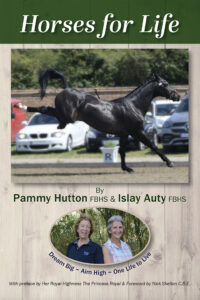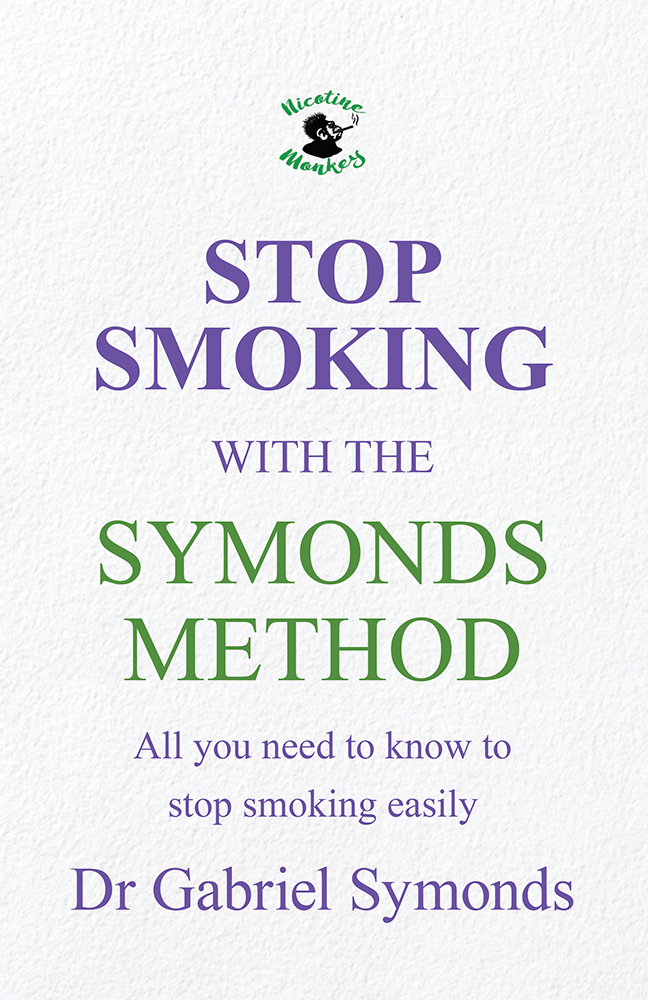
|
The Symonds Method is based on helping smokers to demonstrate to themselves why they really smoke and why quitting seems so hard. Once these are understood, smokers will find there should be no difficulty in refraining from something they don’t want to do anymore. Unlike other quit-smoking books, the unique Symonds Method is simple and quick to learn. No nicotine products (including e-cigarettes), drugs, hypnosis, scare-tactics, or gimmicks are used. |
Available from Amazon |
||||||||
|
Further — * Do not choose a ‘quit date’ - this is setting yourself up for failure * Do not worry about smoking ‘triggers’ - just carry on with your life (except for smoking) * Forget ‘cravings’ - whatever these are * For less than the cost of two weeks’ worth of nicotine patches, this e-book will show you how to get that Nicotine Monkey off your back for good. |
||||||||||
Category Archives: Non-Fiction
Stop Smoking with the Symonds Method
Vegetarian Food for Carnivores
Sarah McLean
|
|
FOR CARNIVORES ISBN: 9781912419845 Hardback - 162 full-colour pages Published Dec 2020 This unique cookery book can be used by anyone - to reduce their meat intake, to feed vegetarian or vegan friends, or to create vegetarian meals that even carnivores will enjoy. Easy-to-follow recipes provide a host of popular alternatives to meat dishes, and all without losing any of the flavour. To make things even easier, the ingredients are readily accessible from mainstream supermarkets. Sarah McLean’s family-friendly meals are based on traditional recipes that most of us know and love. She has drawn on her experience as chef, nurse and mother-of-three to produce a feast of a book that crosses the boundary between vegetarian and meat-based cookery. |
USE YOUR PROMO-CODE before it expires to get your discount
2 copies: 10%; 3 copies: 15% 4 copies: 20%; 5 copies: 25% For non-UK sales Contact: sales@youcaxton.co.uk | ||||||||||||||
Horses for Life – With foreword by Princess Anne
Pammy Hutton & Islay Auty
|
|
Horses For Life Publication: 15th Nov 2020 UK Sales Only
2 copies: 10%; 3 copies: 15% 4 copies: 20%; 5 copies: 25% Contact: sales@youcaxton.co.uk For Non-UK orders Or Buy now on Amazon |
|||||||||||||||
|
PROFILE of the Authors...
Pammy Hutton FBHS is a Fellow of the British Horse Society, British Dressage Accredited Coach, Judge, an International Dressage rider and trainer. The joint owner with her husband Brian, of the world renowned Talland School of Equitation in Cirencester, Gloucestershire, she is the daughter of the late Colonel & Mrs Sivewright and the mother of two successful riders/trainers Charlie and Pippa. Five decades of international riding and teaching experience all over the world, have included working with Olympic Teams in Italy, Australia and Ireland with numerous
individual coaching successes, some of whom are featured in this book. Her talents include being an able musician, gardener and cook, with a passion for helping the development of youth who share the enthusiasm and love of the horse. Islay Auty FBHS BA(hons)Ed is a Fellow of the British Horse Society, British Dressage Accredited Coach, Coach Educator and Judge. Five decades in the horse industry including running a riding school, producing young horses and competing in all three disciplines, has evolved into her areas of expertise, which are regarded as development of youth and coach education. She has world wide international experience in these fi elds as well as regularly coaching competitive partnerships at home. Mentoring young professionals in the horse industry has become an important part of her life in latter years. She is the author of 14 books. Married to David with one son and two grandchildren, Islay remains passionate about the love of the horse as an enduring part of her life. | ||||||||||||||||
Pebbles of Inspiration
Daniela Svampa Cowie

|
Pebbles of Inspiration Daniela Svampa Cowie I have had ample opportunity throughout my unsettled life-journey to ponder on the reflective passages and to focus on the positive quotes and reminders that I share in this rich collection. With their aid I hope to bring light and hope into your life. We all need a little extra inner sunshine and encouragement on those days when we walk in troubled waters - and on those days when we are flying high, may this book be an accompanying and reassuring guide. Read from the beginning or let your heart guide you to a page by chance. Either way, may it serve you, inspire and enrich your journey as you unveil your life. |
£9.99 (+ £2.50 postage) Available from Amazon |
||||||||
|
|
||||||||||
A Social Entrepreneurship approach to Jewish education
Second edition
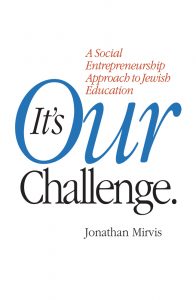
|
Professor Steven M. Cohen Research Professor of Jewish Social Policy, Hebrew Union College-Jewish Institute of Religion Jonathan Mirvis has written a provocative and invaluable tract for our times, and for the uncertain times ahead. Whether Jewish “peoplehood” will have any meaning for the next generation in Israel and the Diaspora, depends largely on whether Jewish education can re-invent itself. Not only for our children and grand-children, but for “adults” and whole communities as well. Jerry Silverman President/CEO, Jewish Federations of North America |
and Amazon Kindle Books Order 5+ copies to receive Trade discounts and Free delivery USA : $15.99 Discount price: $11.99 Free delivery UK : £11.99 Discount price: £9.49 Free delivery Canada : CAN$ 22.00 Discount price: CAN$16.99 Free delivery Australia : AUS$ 25.00 Discount price: AUS$16.99 Free delivery South Africa : Israel: Discount price: £14.99 Free delivery by Courier |
||||||
|
The good news is that Mirvis believes it can happen. He shows us how to build on the trailblazing initiatives of some of the visionary Jewish educators and funders who’ve “changed the rules” – and whose stories Mirvis tells with great warmth and insight. And, critically for the author, by adapting his theory of change as it applies to social entrepreneurship marketing, and the online knowledge revolution. This is not just an important book about the need for more “disruptive innovation” in the Jewish world; Mirvis is himself the “disruptive innovator”. He’s brought together his wide experience in adult Jewish education internationally, his deep immersion in Yiddishkeit, and some novel, even radical thinking about – dare we say it – how to market and sell a social product. Ever the teacher, he’s given educators, funders, policy-makers, and community leaders essential homework to complete. Read this book!
|
||||||||
Jewish Philanthropy.
Dr. Jonathan Mirvis has just released a very exciting book, It’s Our Challenge: A Social Entrepreneurship Approach to Jewish Education. Its most surprising aspect is that it has implications not just for Jewish education providers but also for all Jewish organizations and their professional and volunteer leadership around the globe. Dr. Mirvis, who is a senior lecturer at The Hebrew University’s Melton Centre for Jewish Education , is a pioneer in teaching social entrepreneurship to students in education, nonprofit management and business administration. Although the book gives a spot-on analysis of entrepreneurship in Jewish education, its salient contribution is demonstrating not only the importance of creative and innovative thinking but also the impact that volunteer leaders and professionals can have in the Jewish community by thinking differently about what they do and how they do it.
Read the full review here...
Discover Your Inner GPS
Karen O’Donnell
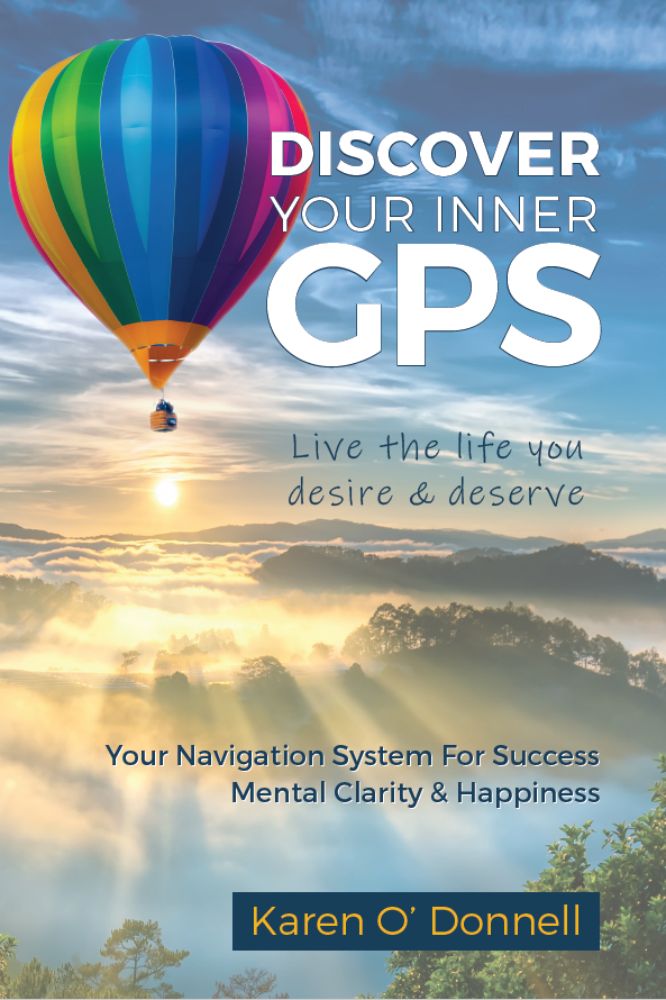
|
Discover Your Inner GPS Karen O'Donnell Following a near-death experience that left her contemplating her past, Karen O’Donnell set out with new determination to be seen and heard. The message?You don’t have to wait until some life-altering event forces you to wake up. The time to wake up is now.Have you ever wondered…Why does life seem to be passing me by?Why don’t I get the success I deserve?Why am I even here?These questions provoked a journey of self-discovery, resulting in a powerful system to explore your own life and experience it as you were meant to live it — with happiness, clarity and success.Discover Your Inner GPS is a simple and effective guide to personal transformation that will help you understand how you can change your life to one you desire and deserve. |
£13.99 (+ £2 P&P) Available from Amazon |
||||||||
|
The title is very appropriate as it is a map for inner well-being and development of the self. Karen’s extensive studies in various fields, make her the ideal person to lay out a map for those seeking fulfilment. The book is set out in various steps to be followed and worked at to develop a healthy and holistic lifestyle. Dr. Frank McKenna |
||||||||||
Midlife: Problems and Solutions – A Jungian Perspective on the Midlife Crisis
Renata Symonds
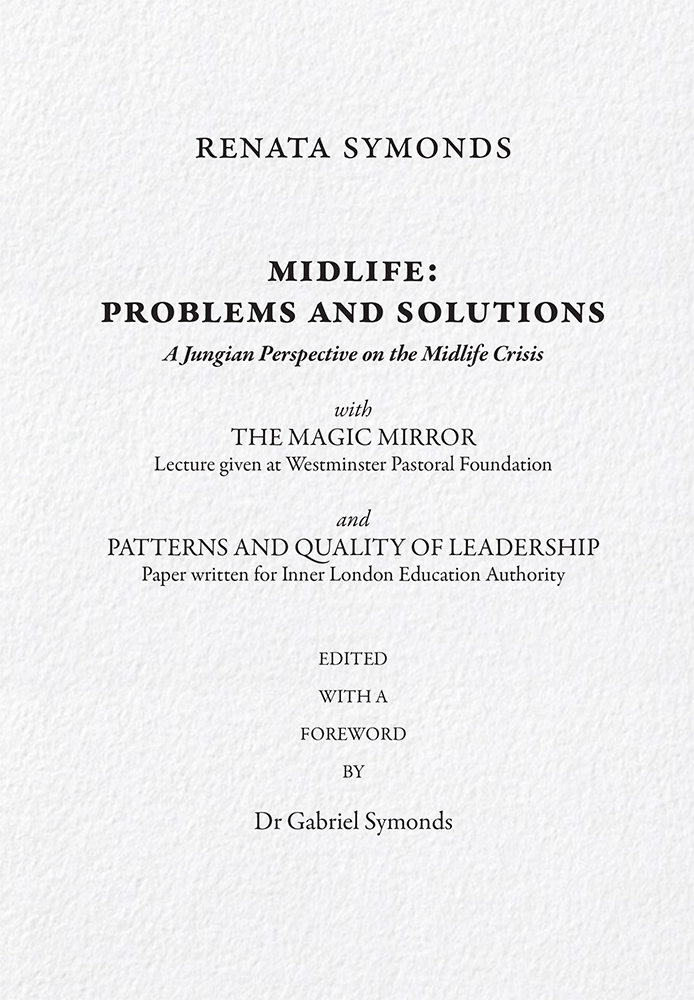
|
This book is the distillation of the professional wisdom of Renata Symonds (1913 – 2007), a London-based Jungian psychotherapist. She deals with the perennial problems of humankind that may particularly become evident at the threshold of the second half of life: finding meaning in one’s existence; facing conflicts in work and marriage; dealing with depression, loneliness, and sexuality; and fear of death. These great themes are explored from the perspective of the writer’s experience in helping people become aware of the unconscious aspects of their problems, especially through dream analysis. Many cases are described of how clients in this way – rather than by resorting to medical drugs to suppress symptoms – make real progress not only in resolving their difficulties but also in achieving inner growth as well. No dry treatise or self-help book – how to recognise if you’re going through a midlife crisis and what to do about it – Renata Symonds speaks with warmth and enthusiasm of her approach to her clients’ difficulties. The text is enriched by references to Jung and Freud and contains many literary and mythological allusions. This book will be of interest to the general reader with a basic knowledge of Jung’s ideas, as well as those undergoing or contemplating psychotherapy. |
£20.00 (+ £2 postage) Available on Amazon | ||||||||
|
Reviews... |
A Snazzy Tale – The Creative Journey of Face Painting for Children
Lauren Staton
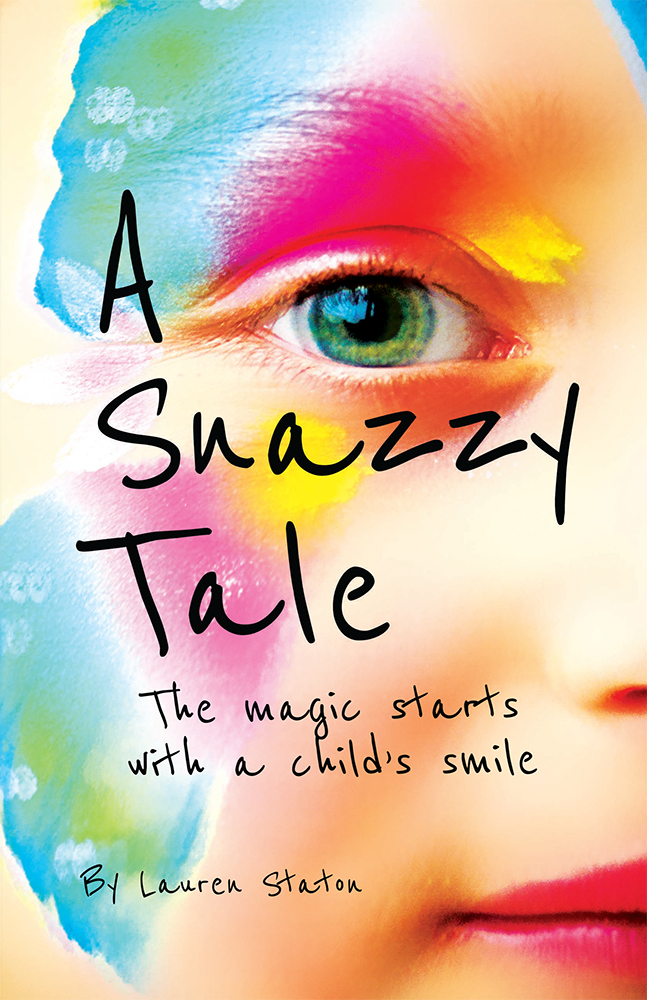
|
Face painting is a wonderful creative activity which has bought a lot of joy to children, delighted parents, and raised millions of funds for charities all over the world. This activity became popular in a very short space of time. This is the fascinating tale of the journey that lead to the creation of the first strong brand of children’s face paints, starting from a small kiosk at a holiday centre in 1985 and eventually reaching a global market. Lauren and Paul Staton were responsible for bringing face-painting products onto the high street and teaching thousands of people about face painting as an entertainment for children. The true journey started years before however. This is an inspirational story of success that grew from passion and from the personal tragedy that fuelled Lauren and Paul's determination. It will teach you that if you have faith in what you want to achieve, you can truly make magic and make-believe happen. |
£9.99 (+ £2 postage) Available on Amazon | ||||||||
|
Reviews... |

